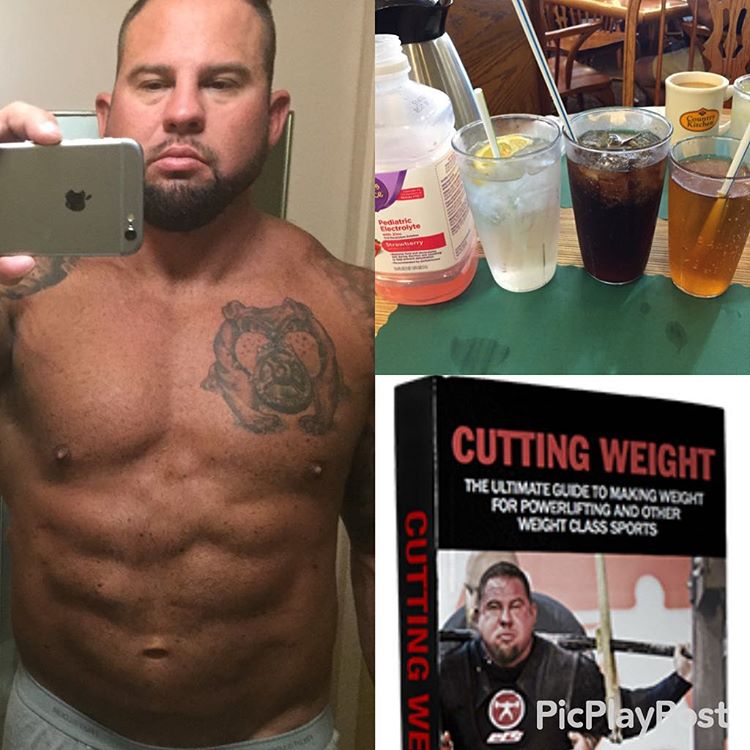
26 Apr Book Excerpt: Cutting Weight
TO CUT, OR NOT TO CUT
Decisions, Decisions
Now that I’m over a decade into my powerlifting career, I look at things a lot differently than I used to. After several years of cutting weight for every meet, it’s not worth it to me to do this anymore. In fact, the only time I suggest cutting is if you’re looking to compete against a particular lifter in a specific weight class, you have some kind of unfinished business in a weight class, or if you’re going for a world record—a true world record, and not some cheesy federation record.
 Wait. This is a weight cutting manual, right? So why am I telling you that it’s not advisable to cut weight in the first place? Well, first off, I meant what I said. Things can go horribly wrong for you, both mentally and physically, if you don’t do everything right. You can have a great fifteen-week training cycle—along with a lot of money and a big opportunity—go down the drain just because you did a bad job of cutting weight.
Wait. This is a weight cutting manual, right? So why am I telling you that it’s not advisable to cut weight in the first place? Well, first off, I meant what I said. Things can go horribly wrong for you, both mentally and physically, if you don’t do everything right. You can have a great fifteen-week training cycle—along with a lot of money and a big opportunity—go down the drain just because you did a bad job of cutting weight.
The key? Pick your spots. If you’re going to do this, do it at the right time, do it carefully, and don’t take it lightly. I say this because one of the major reasons why I suggest that lifters not cut is the fact that it becomes an all-consuming process while you’re doing it.
IMPORTANT NOTE: Do not attempt to cut more than 5 percent if you’re mentally weak and have no heart.
Once you have some experience under your belt, don’t cut for smaller meets. Save your cuts for the big ones. With that said, however, I wouldn’t suggest trying your first major weight cut in the biggest meet of your life. If it’s your first time, try it out in a meet that doesn’t have a world title on the line.
When I was making ten percent cuts, it was all I could think about. It was really the only thing on my mind during meet week—and then, once I actually made weight, I needed to get obsessed with recovering so I could have some decent strength on the platform. The problem with this was that I wasn’t able to fully focus on meet day and the things I had to do. I was always distracted, and things that could have helped me were put on the back-burner. Sometimes this was a good thing, but in general, I wouldn’t suggest being distracted like this on meet day—especially when the distractions are avoidable, and even more so if you’re not a highly experienced competitor.
It can seriously beat you down after a while. I remember always worrying about what I was eating, and always being obsessed with whether my weight was up or down a pound or two—and I’d be pissed if I’d gained anything when I didn’t want to. This type of thing can make you feel like a supermodel instead of a powerlifter, and that’s bad. I wasn’t able to enjoy myself, and constantly starving and dehydrating myself down to nothing wasn’t worth competing in a lower weight class after doing it for so long.
I don’t suggest cutting more than 8-10 percent of your body weight more often than twice per year, because it’s so very taxing, both mentally and physically. When you do it right, you can still perform at 100 percent and look like you belong two weight classes higher, but it takes a lot out of you. Use extreme caution, and do this sparingly.
Like what you’re seeing? Buy the books here.
Brian Carroll
Latest posts by Brian Carroll (see all)
- Brian Carroll Coaches the Birddog - April 24, 2024
- Protected: -Header Image Post Template 2024 - April 18, 2024
- Brian Carroll X Professor Stu McGill full interview 2024 - April 16, 2024





Sorry, the comment form is closed at this time.